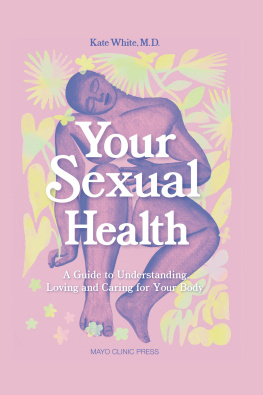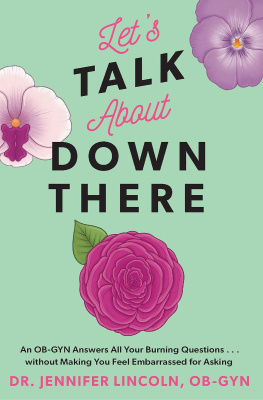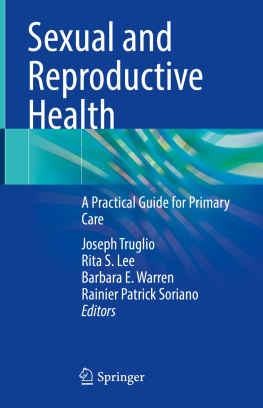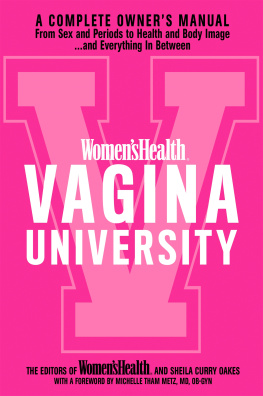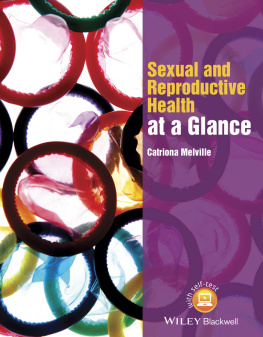

Your Sexual Health
Contents
Introduction
Growing up, my body below my waist was a mystery. I went to Catholic school until I was 12, and my public schools werent much better at teaching me the things I needed to know about sexual health. I didnt know what vaginal discharge was, so was horrified to see wetness on my underwear at age 14 and worried I was peeing myself. My well-meaning mother told me in college that oral sex was perverted. It wasnt until medical school that I finally learned the basics (and then some) about my reproductive health.
You shouldnt have to go to medical school to learn the fundamentals about your body. But where else can you get sexual health knowledge? The internet is a mixed bag of the good, the bad and the intentionally misleading. Unlike your doctor, your search engine isnt board-certified to practice medicine. If youre turning to your siblings and friends for insights, they usually dont have access to information thats any better than you can find (despite how confidently they may give you advice). Even savvy, smart people have been confused by misinformation or conflicting recommendations.
Maybe you know the basics but want more details about how your private parts work and how best to use them. You can find yourself lost trying to get the knowledge you need to make the best choices about your health. Its tough to find good information about sex toys because they make some people blush or giggle. Or about how birth control affects your periods, because the glossy pamphlets you get in the doctors office are a sales pitch. Or about abortion because its so politically charged. And youll rarely see a doctors office brochure about anal sex.
Thats why I wrote this book.
Your Sexual Health is full of the critical knowledge and secrets Ive learned from being an obstetrician-gynecologist and a health writer for more than 20 years. This book offers answers to the questions patients and reporters have asked me repeatedly and the questions youve maybe been too embarrassed to ask. The information in this book will help you make solid decisions, feel less anxious and control your reproductive destiny. Consider this book your crash course in better sexual health.
Note: This book is intended for people with a vagina, of any identity or orientation. Gendered language and references to hetero or lesbian women reflect the limitations of published research that hasnt caught up to the times.
Part I. Gyno Health The land down under


You may be calling your parts by the wrong names.
Youll hear the word vagina used to refer to the genitals of a person assigned female at birth. The vagina is an amazing organ it can stretch to accommodate nearly anything thats put inside it, and almost any baby on its way out. But the vagina is inside the body. The only way you can see the vagina is with a speculum and a hand mirror.
The part of the anatomy you can easily see is the vulva. Your vulva begins at the clitoris and the skin (hood) covering it. Packed with nerve endings, this is the most sensitive spot on your body, and the only human organ dedicated purely to pleasure. The vulva then extends down to your perineum, the skin and muscle in between the opening of your vagina and your anus.
In between, you have two sets of lips (labia). The outer set is called the labia majora. This is what forms a cameltoe when you wear tight clothing. The inner set is called the labia minora and can be pierced if youre adventurous. Go to MayoClinic.org and search on vulva to get a closer look at all the parts described here.
Knowing whats where will help you understand how your body behaves and help you talk with your gyno when something seems funky.
Your labia are normal, no matter how long or short they are.
Genitals come in an array of shapes, sizes and colors. Some people have thin labia (minora) that extend out beyond the plump ones (majora). Other peoples thin labia are totally covered. No matter what you may have seen in porn or on a partner, yours are just fine.
Unethical doctors will prey on peoples body insecurity and offer them cosmetic surgery for their labia so they can match up to some mythical ideal. But there are only two indications for someone to take a scalpel to your nether region: for gender reassignment/realignment, or if your labia are long enough to cause pain with intercourse or tight clothing. Otherwise, accept your labia like you do the rest of your body, in all its quirky wonder.
And in case youre wondering about how a partner may view your body? Any partner who sees you naked should count their lucky stars that they get to be that close to you, first and foremost. If your partner has anything to say about your labia or any other part of your body thats not akin to ecstatic worship, its time to trade up to someone worthy of you.
Your vagina should smell (and taste) like a vagina.
Not berries, flowers or a tropical island. You have a naturally musky, pheromone-filled scent. And the taste of your vagina varies depending on where you are in your cycle muskier around ovulation, and metallic-tinged when youre bleeding. Attempting to cover up your scent with sprays and powders may trigger irritation of the vulva and vagina (contact dermatitis) and lead to more discharge and possibly an infection. What about those blogs that tell you to eat pineapples or avoid asparagus to improve the way you taste? Theres no science that proves theres a relationship between your diet and your taste or odor.
If you notice a strange odor, particularly a fishy one, have your gyno check you out for a vaginal infection. Your gyno can take a simple swab of your vagina, and youll have results in 24 48 hours. Otherwise, you smell and taste just the way you should. And any partner who has a problem with the way your vagina (naturally) smells or tastes should lose the privilege to be anywhere near one.
Protect your parts, not your panties.
Its not uncommon to be bothered by vaginal discharge its one of the most common reasons for a gyno visit. When people dont like the feeling of moisture on their underwear, they may use a pantiliner every day. But blocking your vagina with a pad is the worst thing you can do. When your vagina cant breathe, it may react by producing even more discharge. This can happen even with reusable liners. Plus, tossing all those disposable liners is rotten for the environment. Save the liners for light period days.
If your panties get wet, simply change them. The reason we wear underwear is to protect our clothes. You shouldnt use liners to protect your underwear. If youre out and about, bring along a spare pair of underwear in a plastic bag. When youre ready to swap, just zip the old ones into the bag. Easy-peasy.
Douching your discharge is dangerous.
A vagina naturally has discharge same goes for many transwomens vaginas after gender affirmation surgery. Discharge is how your vagina cleans itself, keeps the tissue moist, gets you ready for intercourse and helps prevent infection. Think of it as daily intimate housekeeping. Your discharge should be clear, white, or off-white, though it varies in amount and consistency at different times in your cycle, at different ages, and if youre on certain medications.
Next page
